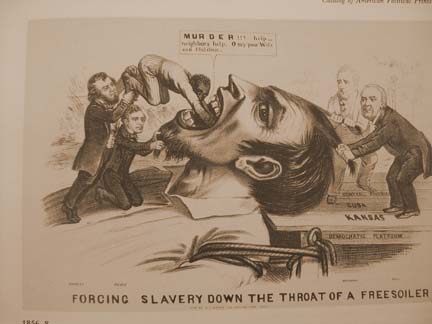
The conservative Whig game plan at the beginning of 1854 to ride anti-Kansas Nebraska to victory foundered almost immediately because they lost control of the terms of the debate. Radical free soilers denounced the Act as an aggression of the evil Slave Power; southern Whigs were therefore unwilling or unable to oppose the Act. The Whigs were unable to heal their sectional wounds.
Contrary to common assumption, however, it was not the incipient anti-Nebraska coalition that really destroyed the Whigs as a viable party during 1854. The true culprits were a mistaken assumption about the nature of American politics in the 1850s and a political thunderbolt that came out the blue.
The assumption was that Democratic losses would more or less automatically translate into Whig gains: in other words, that politics was a zero sum game between the two major parties. For the past 150 years, this has largely been the case. The antebellum era was different.
As Michael Holt has explained, the entrenchment of current parties is largely attributable to the adoption of state-printed ballots in the 1890s. This development
Before the Civil War, however, these impediments did not exist. To the contrary,
The thunderbolt was the Know Nothings.
Contrary to common assumption, however, it was not the incipient anti-Nebraska coalition that really destroyed the Whigs as a viable party during 1854. The true culprits were a mistaken assumption about the nature of American politics in the 1850s and a political thunderbolt that came out the blue.
The assumption was that Democratic losses would more or less automatically translate into Whig gains: in other words, that politics was a zero sum game between the two major parties. For the past 150 years, this has largely been the case. The antebellum era was different.
As Michael Holt has explained, the entrenchment of current parties is largely attributable to the adoption of state-printed ballots in the 1890s. This development
measurably increased the difficulty of launching a third party . . .. Since those major parties had an automatic slot on the ballots governments prepared and since the legal hurdles for other parties to get on those ballots were so high, Republicans and Democrats effectively monopolized voters’ choices.
Before the Civil War, however, these impediments did not exist. To the contrary,
the rules of the political game encouraged rather than inhibited the creation of new parties. Instead of state-printed ballots that gave legally recognized major parties pride of place and disadvantaged other groups who sought to be listed on them, political parties printed their own ballots. As a result, it was far easier for new parties to challenge the old ones.
The thunderbolt was the Know Nothings.






Great cartoon. Got details on it? Did you find it online?
ReplyDelete